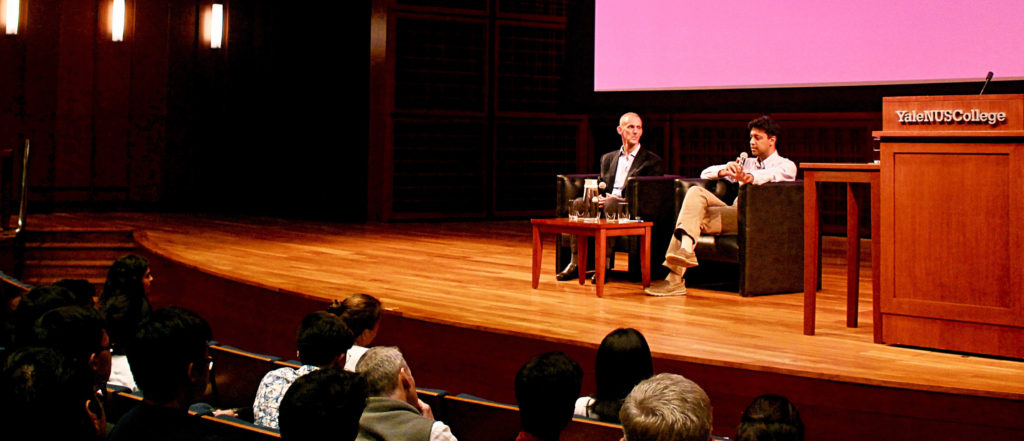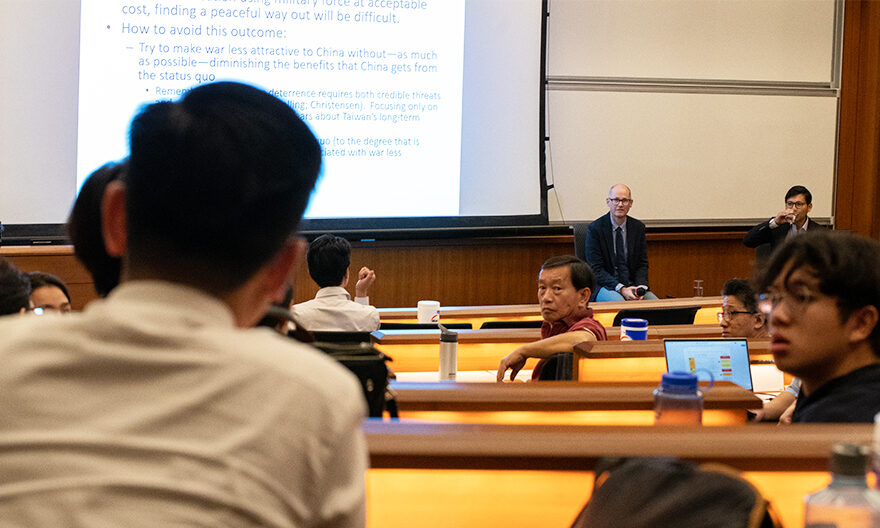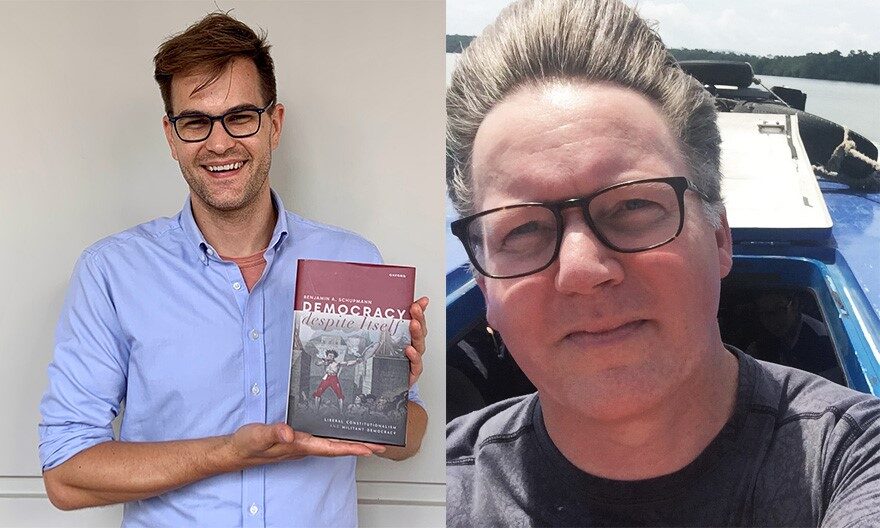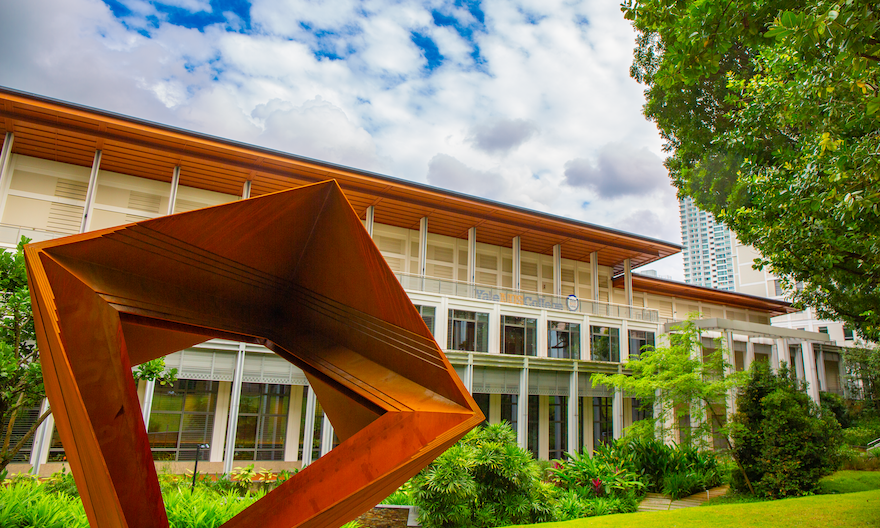Yale Economics Professor kicks off Yale-NUS Lecture on Global Affairs
Yale-NUS College hosted the inaugural Yale-NUS Lecture on Global Affairs on 11 September 2018, the first in a series of annual talks sponsored by Professor Saw Swee Hock. Delivered by Yale Professor of Economics Ahmed Mushfiq Mobarak, the lecture focused on what keeps people and countries poor.
 Image by Lu Zhaoyu Bozy for Yale-NUS College.
Image by Lu Zhaoyu Bozy for Yale-NUS College.
Titled “Strategies to Increase Adoption of Welfare-Improving Behaviours in Developing Countries”, the lecture started with a question: “Why don’t the poor adopt products that can improve their welfare?”
Professor Mobarak explained that as a development economist, he is interested in why technological or other types of innovations that can help to reduce poverty are often in low demand by those who would benefit most from them.
He cited research he was conducting on how rural-urban migration was affecting seasonal poverty in Bangladesh and Indonesia. In his study, rural households were offered transport incentives for a member of the family to seek employment in nearby cities.
He found that migration occurred among 58 percent of households that were incentivised compared to only 36 percent among households that were not incentivised.
Professor Mobarak explained that one of the key reasons that had prevented people from migrating previously was the fact that they were living at a subsistence level and were not able to afford making the investment into the costs associated with travelling to the city.
“In my research, I am interested in understanding what keeps people and countries poor even when there are obvious solutions that can improve their welfare,” said Professor Mobarak, who holds a concurrent appointment in the Yale School of Management and is the founder and faculty director of the Yale Research Initiative on Innovation and Scale.
“What this research demonstrates is how factors like risk aversion, lack of information and a lack of money affect poor people from making decisions that would benefit them.”
Professor Mobarak is also a member of the Board of Directors of the Jameel Poverty Action Lab at MIT and serves as academic lead for the Bangladesh Research Program for the International Growth Centre at the London School of Economics, and Scientific Advisor to Innovations for Poverty Action, Bangladesh.
The lecture started with an opening address by Head of Studies for Global Affairs and Associate Professor of Social Sciences (International Relations) William Bain.
 Assoc Prof William Bain delivering the opening statement. Image by Lu Zhaoyu Bozy for Yale-NUS College.
Assoc Prof William Bain delivering the opening statement. Image by Lu Zhaoyu Bozy for Yale-NUS College.
He noted that by establishing the lecture series, Professor Saw had “renewed the call for us to strive for a better world through education”.
“Your vision will enable the current generation of students and faculty to strive for a better world for future generations,” Assoc Prof Bain said. “On behalf of Global Affairs and the entire Yale-NUS community, I want to acknowledge our enormous debt of gratitude for your generosity and for inspiring us in answering this call.”
On why he decided to sponsor the lecture series, Professor Saw, who was at the event, explained, “I believe that it is important for students to develop global perspectives on the world and on the many complex issues surrounding it.”
“Having previously sponsored the Goh Keng Swee Lecture on Modern China at the NUS East Asian Institute, I believe that establishing the Yale-NUS Lecture on Global Affairs at the College will enable students to learn from the insights of eminent speakers in this field, and in doing so, better understand our ever-changing global landscape and develop solutions to today’s challenges,” he said.
 Professor Saw Swee Hock (second from right) sponsored the lecture. Image by Lu Zhaoyu Bozy for Yale-NUS College..
Professor Saw Swee Hock (second from right) sponsored the lecture. Image by Lu Zhaoyu Bozy for Yale-NUS College..
Professor Saw added that the College is “well-known for its combination of pedagogies, cultures and philosophies from both East and West, and for integrating learning across various disciplines”.
“Having this lecture series at the College will enable it to continue fulfilling its mission of redefining liberal arts and science education for our complex and interconnected world, particularly as our students explore questions pertaining to globalisation and human interconnectedness,” he said.
Professor Mobarak’s lecture was well-received by members of the College community, visitors from other institutions and the general public. One of the Yale-NUS students who attended the lecture was Keith Yap (Class of 2020). A Philosophy, Politics and Economics major, Keith was “particularly excited to find out that what we learnt in our classrooms could be applied in the real world, which could help thousands of households achieve upward socio-economic mobility”.
Helena Auerswald (Class of 2019), a Global Affairs major who was also at the talk, said it “offered fascinating insight into how to conduct rigorous social science research and translate findings into context-specific policy solutions”.
“As a Global Affairs major, this connection between research and policy is a crucial component of the Global Affairs interdisciplinary mindset, so it was invaluable to learn about Professor Mobarak’s approach to experimental design, data collection, analysis and policy development,” she said.
During his time in Singapore and at the College, Professor Mobarak also had the opportunity to meet with Yale-NUS students, faculty and administrators.
“The students are bright and curious, and I was most impressed with the social science faculty’s engagement with top-quality research,” he said. “The trip left me more convinced that research and teaching are complementary (not competing) activities.”
He added that he was “impressed with how engaged the students and faculty were”.
“The students were willing to challenge the speaker, which is great to see. I’m glad that this aspect of liberal arts education that involves an exchange of ideas has already taken root at Yale-NUS,” he said.
On what future topics the lecture series will address, Assoc Prof Bain said that the future of the global order remains an important and timely topic.
“The tectonic plates of global order seem to be shifting at a pace not seen in several decades, dating perhaps to the Second World War,” he said. “An important part of that story is the rise of non-Western great powers, China most obviously, as well as the fraying of Western alliances. As Singapore sits at the intersection of these changes, these issues are particularly cogent at the moment.”




